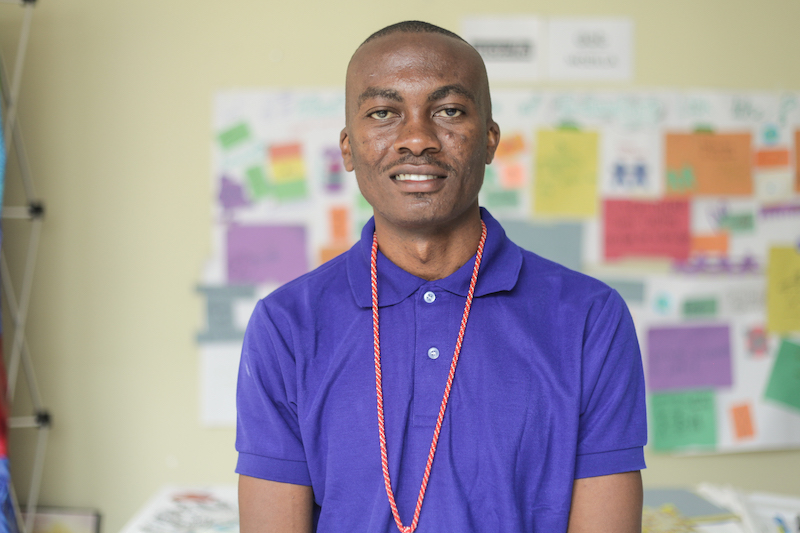Story
Julius

Making healthy food accessible and connecting farmers to digital opportunities
Accessing healthy food is not always easy when living in a large city like Dar es Salaam. You might know the location of markets and grocery stores, but traffic and a lack of time make it impossible to get to them. So you eat unhealthy, fast food instead – or buy groceries that are locally available with a limited range of products and usually sold at a higher price.
Julius J. Julius is making healthy food available at the touch of a button. The social innovator from Tanzania is the creator of Click n’ Cart, an online platform where customers can have fresh and healthy groceries delivered to their home. Orders are placed by smartphone, tablet, or computer, and can be dropped off at any address in Dar es Salaam within the hour.
The Click n’ Cart solution
Click n’ Cart’s services will benefit a number of groups. First, there are the customers: busy professionals who work late and do not have the time to grocery shop. Other customers include less privileged groups, such as those with disabilities, single mothers, or people in areas without a place to buy healthy food.
Once the platform is fully operational, customers will be able to go online and select their neighbourhood. Then, they pick a local grocery store, select their products, and choose their payment mode: mobile money or cash on delivery. Once the order is made, a Click n’ Cart buyer goes to the shop to get the groceries, avoiding the city’s traffic snarls by taking motorcycle taxis or bajajis (auto rickshaw) to the customer’s homes.
Once the platform is fully operational, customers will be able to go online and select their neighbourhood. Then, they pick a local grocery store, select their products, and choose their payment mode: mobile money or cash on delivery.
Click n’ Cart buyers are specially trained by partner shops on the quality of different products and how to handle them. This knowledge will then be passed down to benefit customers.
The online platform makes its money through a small convenience fee charged for transportation, and Click n’ Cart gets a commission for a certain percent of customer purchases. Julius also envisions putting paid grocery store advertisements on the platform’s website.
Impact on local farmers
Through education, local food producers become another beneficiary of Click n’ Cart. Products from small-scale farmers are often not accepted into retail stores because of branding and packaging issues. Click n’ Cart plans to have grocery store partners work with producers to change this. They will explain how to add value to their products, and how to pack and brand those items to meet the requirements of the shop.
Products from small-scale farmers are often not accepted into retail stores because of branding and packaging issues. Click n’ Cart plans to have grocery store partners work with producers to change this.
Julius plans to involve grocery shop partners that value local products. “By expanding our customer base we will be triggering local farmers’ products when it comes to eggs, chicken, honey, and more,” he explains.
Click n’ Cart’s startup challenges
Social entrepreneurship is not an easy journey.
“It is hard for entrepreneurs to build a team,” Julius admits. “Getting someone who can share your vision is difficult.”
Through Digital Opportunity Trust (DOT)’s programs for social entrepreneurs, Julius realized team building must rely on open collaboration — letting everyone know where the idea is going, and creating a sense of ownership, even if that means providing equity in the business. While it involves a swallowing of pride, Julius says this is the only way. “You have to be frank from the beginning and say that you do not have money or resources yet, but you have a good idea you are working towards,” he adds.
“Dar es Salaam’s startup ecosystem is growing, but it is still in the very early stages, so there are not many stakeholders around,” he says. “More startup gatherings and hackathons would help. It would also help if the government put more value in the role of entrepreneurship in the economy.” Through DOT’s peer support platform, Innojo, Julius is finding the peer support he needs from social innovators around the world.
At DOT we’re excited to bring you inspiring stories that highlight the impact of daring young social entrepreneurs. Social entrepreneurship and social innovation is an ongoing journey, so we invite you to follow along with Julius by following him on Twitter at @jjmbungo.
This #DOTYouth Spotlight was developed as a part of DOT’s 2017 Unconference in Kenya, supported by the Mastercard Foundation and the Government of Canada through Global Affairs Canada.
Are you our next Community Leader, Digital Champion, or Social Innovator? Learn more about how to join #DOTYouth
Join #DOTYouthShare this STORY
More STORIES
Read more inspiring stories like Julius.